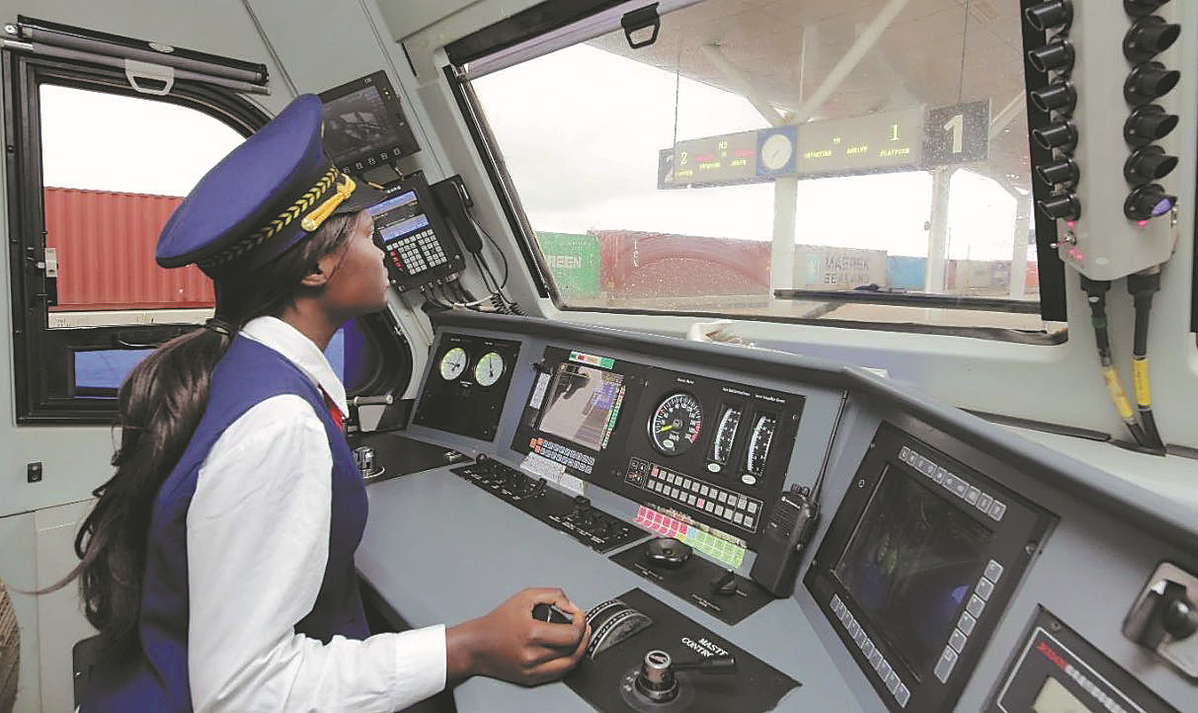
Concilia Owire operates a train in Kenya. (Photo: China Daily)
Concilia Owire is a role model for many girls in Kenya.
As one of the first female train drivers in the country, she often visits schools and organizations to talk to students, especially girls, to show them what women can achieve in a male-dominated field. Sometimes, youth organizations also bring girls to meet her and listen to her inspirational stories at her workplace.
The 28-year-old is also an instructor at the Africa Star Railway Company, a subsidiary of the China Communications Construction Company, and in May 2017, she helped inaugurate the Chinese-built Mombasa-Nairobi Standard Gauge Railway by driving the train that carried Kenyan President Uhuru Kenyatta as one of its passengers.
In October 2019, Kenyatta was on another maiden journey along the first section of the Nairobi-Malaba Railway, also built by China, on a train also operated by Owire.
While she is one of the best train drivers in Kenya, some people had doubts about her abilities at the beginning of her career in 2016.
"Kenyan society did not expect a woman to take STEM courses, to become an engineer or a train operator. They don't believe in you as a woman," she said.
"When they saw me in the driving room, they asked questions like 'Will she be able to drive the train?' I had to work very hard to prove that female train drivers are really good at their job," she added.
Owire grew up dreaming of becoming an engineer because of her elder brother, who is also an engineer.
"I saw him as a role model. As I was growing up, I just wanted to be like him," Owire said, adding that being a train driver is not considered a "feminine" job suited to women, especially in Kenya. "I wanted to be the pioneer."
At school, she excelled at STEM courses such as maths and physics and chose electrical engineering as her university major.
Her life-changing moment came in 2016, when along with seven other women, she was chosen to become a train driver trainee by the CCCC. She is very grateful that the company accepted her.
"Without this opportunity, even if I believed in myself, I would have had no chance to prove it," she said.
She received training in both Kenya and in China through a company sponsorship, visiting China twice to learn train driving and management. She also studied under Chinese instructors in Kenya.
Owire said she is confident about operating locomotives because she learned from the best, and her colleagues, who are mostly men, have been very supportive.
"They believe in gender equality," she said, adding that their attitude shines a light on the development of the job. "In the future, more women will be able to do it."
She and her seven female colleagues often get together to share their experiences and challenges at work. "We support each other. We cannot do this alone."
Like Owire, her colleagues also go to schools to talk to young girls.
"We tell them we are female train drivers, and that if we can do it, they can do it as well," she said.
The first time Owire drove a real train was in China, during training in 2017. Despite being accompanied by an instructor who showed her what to do, she said she was nervous at the time, but felt fulfilled afterward.
"I was really, really nervous about driving a locomotive in another country, and for the first time," she recalled. "But once I saw the train moving, I felt really proud of myself."
She believes that discipline is key to being a good train driver.
Safety is the top priority, so drivers have to follow regulations carefully.
While she is extremely proud of what she does, Owire admits that her busy schedule does take up most of her social life.
Luckily, she is supported by her family and friends. Although they were uneasy when she first signed up for the job, she has earned her family's support by demonstrating her ability.
These days, she receives plenty of positive feedback and has been promoted to train new drivers, though on the instruction trips she sometimes drives the train herself.
"I have to keep my skills sharp, too," she said.
Her passengers also have greater faith in her abilities.
"Now, when they see female drivers, they greet us, cheer us on and tell us to keep working hard," she said.
In addition to continuing to fight for gender equality, Owire dreams of driving on an electrified line in Kenya one day, and also of becoming a railway ambassador to show her compatriots the benefits of a modern railway network like the one in China.


